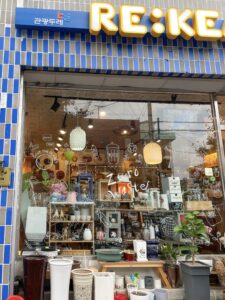Small but Significant
by Lydia Yang, serving with the Presbyterian Church in the Republic of Korea (PROK)

Recently I was invited to join the staff of the PROK Women’s Association Department of Education and their students on a trip to Cheongju city to visit two churches actively responding to climate change. Both churches are recognized by the Christian Environmental Movement Coalition for their commitment to creating green churches and doing their part as churches for the environment. Climate justice is not only a practice they have adopted. It is also ingrained in their vision and mission. From small changes within the church to the larger community, these churches are working to bring a new perspective to where nature and the earth are interlaced with faith and spirituality.
The churches are actively working to become more eco-friendly while providing the space and opportunity for the neighborhood and community around them to participate. A simple transition from disposable cups to reusable (washable) cups has decreased the amount of trash produced. In recognizing that the church also creates a lot of paper waste, from weekly bulletins, sermons, announcements, and newsletters, the churches have worked to find alternative and more eco-friendly options. The alternatives have included asking the question of which printed materials are a necessity or simply an easy way to continue how things have always been, and then looking into more environmentally friendly and sustainable paper options such as paper made from sugar cane. One of the churches we visited also built a small rooftop garden to provide young children the opportunity to learn about plants and how fruits and vegetables grow.

Both churches have also reached out to their wider community to address climate change. At one of the churches we visited, every Thursday morning after early morning prayer, church members and the senior pastor gather to walk around the neighborhood to pick up trash. What began as a small project for the church has grown to help foster a better relationship between the church and the surrounding community. My favorite part when visiting the churches was visiting the zero-waste shop each church had opened and was operating. Making changes to become green and zero-waste is not always accessible and can often be expensive. To encourage and help individuals and families make small but significant changes to become greener, both churches opened zero-waste shops that sell a variety of sustainable, eco-friendly personal care products and household goods. Through these zero-waste shops, the churches hope to continue to bring awareness and help take the step against climate change with their surrounding communities.
The climate crisis is not a standalone issue that can be ignored. The climate crisis impacts the entire world, our everyday lives, and the future. The church is in a unique position to bring about change and awareness. As people of faith and with love for God and all creation, the church should be an example in showing that when people take on small actions to become more eco-friendly, communities gather and form to bring about more significant change to our world. Although it may start small, from an individual, a church, or a community, this is where the work for climate justice begins.
Lydia Yang serves with the Presbyterian Church in the Republic of Korea (PROK). Her appointment is made possible by gifts to the Disciples Mission Fund, Our Church’s Wider Mission, WOC, and your special gifts.

